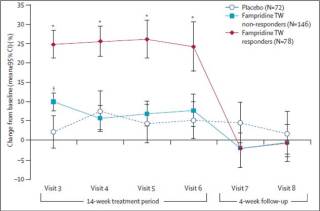As a follow-up to my post yesterday.
“Roshni was correct; well done!”
The main consequence to slowed conduction is fatigue. The commonest example is exercise-induced fatigue. For example you may find that as you walk or exercise it becomes more difficult; your leg begins to drag, your vision may blur or your thought processes seem to slow. The reason for this is that those demyelinated segments in the nerve stop conducting due to conduction block. Why this happens is complex, but could be related to an energy deficit, a rise in body temperature, or both. The molecules that transmit the electrical signal down a nerve fibre, are little pumps (ion pumps) and require energy to work. In addition, these ion pumps are optimised to function at a certain temperature, this is why some MS’ers are heat sensitive.
“Have you heard of Uhthoff’s phenomenon?”
Wilhelm Uhthoff (1853-1927) was a famous German Professor of ophthalmology who described temporary visual loss associated with optic neuritis linked to physical exercise. This was later found to be caused by a rise in body temperature. This phenomenon is now known to affect other neurological systems as well, for example the motor system when walking, balance and sensory pathways and even the cognitive centres.
Up until recently, apart from cooling, we have not had a treatment for Uhthoff’s phenomenon. More recently the drug Fampridine has been licensed to improve walking speed in MS’ers; I suspect that MS’ers with heat sensitivity or fatigue-related conduction block will be more likely to be fampridine responders (see figure below).
“Symptomatic treatments remain the mainstay of MS therapies; having drugs to treat fatigue due to conduction block are welcomed. However, I remain sceptical about their long-term effectiveness which is why we need effective remyelination therapies.”
“Remyelination therapies, should be neuroprotective preventing or slowing down the degeneration of nerve fibres that have been left vulnerable by demyelination.”
CoI: Multiple

Re: "we need effective remyelination therapies."How's that working out for you Prof G? Any developments to report on?
Re: "How's that working out for you Prof G?"I think we have only just developed and validated the tools for detecting remyelination. I think some of the existing drugs and those in development will impact on these outcomes. So please watch this space.
Fampridine – seems to be approved in the EU/UK – is it available for MS patients on prescription in the UK? We normally vaguely ignore drug releases as they are usually for RRMS but this sounds like a something someone at this phase with these symptoms would cry out for.
Re "I think we have only just developed and validated the tools for detecting remyelination. I think some of the existing drugs and those in development will impact on these outcomes."This is what gives me hope, but the lack of detectable drugs is a sore point. Every time I go to the hospital they just say there's nothing they can do for me yet and send me home for another 6 months. I think people get CCSVI simply because there's nothing else for them. It is, right now, a hopeless case.
Re: " I think people get CCSVI simply because there's nothing else for them. It is, right now, a hopeless case."Yes, I think everything that is now emerging is telling us that the CCSVI story is not stacking up. There is more data to emerge. The worrying thing about this whole saga is the fact that Zamboni has massive conflicts of interest; he has patents in relation to CCSVI and makes money from the company that sells the equipment for diagnosing CCSVI. If he had declared these conflicts of interest early on I suspect we would have been much more critical of his claims. The message should be transparency, transparency, transparency.
This goes someway to explaining why my balance was awful and I had tremenndous difficulty walking after sitting in the evening sun drinking a Pimms
I suspect that MS'ers with heat sensitivity or fatigue-related conduction block will be more likely to be fampridine respondersyou are definitely right. In this case. Having been on fampridine for nine weeks now. It is a revelation to be able to have a shower using my Zimmer frame with seat and stand to dry myself.I am able to mobilise around the kitchen and wet room with far greater ease.I would be assessed as being quite disabled scoring 6.5 on the EDSS.Gavin's observations. I would say stand to be correct.